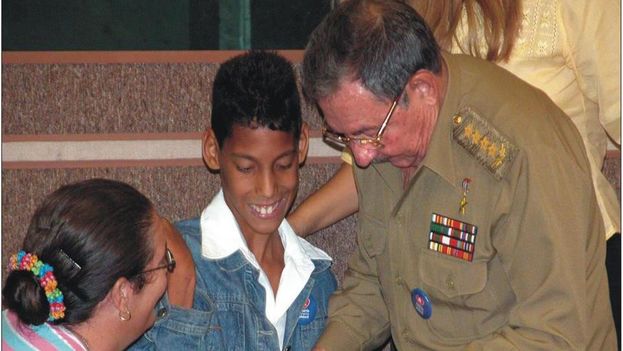
![]() 14ymedio, Ignacio de la Paz, Camagüey, 19 August 2016 — The Revolution needs to constantly reinvent new ideological struggles, constructing new heroes that meet the demands of the so-called ideological work with the masses. Thus, after the stage of the founding epic there was the release in 1988 of Orlando Cardoso Villavicencio, who had been held for nearly 12 years by Eritrean rebels, later there was the ideological battle for the return of Elian Gonzalez and finally, the struggle began for the return of the Five Heroes imprisoned by the “empire.” The saga of revolutionary heroes could not be finalized once and for all, and now a new one is being constructed, Jorge Enrique Jerez Belisario, otherwise known as Jorgito the Disabled.
14ymedio, Ignacio de la Paz, Camagüey, 19 August 2016 — The Revolution needs to constantly reinvent new ideological struggles, constructing new heroes that meet the demands of the so-called ideological work with the masses. Thus, after the stage of the founding epic there was the release in 1988 of Orlando Cardoso Villavicencio, who had been held for nearly 12 years by Eritrean rebels, later there was the ideological battle for the return of Elian Gonzalez and finally, the struggle began for the return of the Five Heroes imprisoned by the “empire.” The saga of revolutionary heroes could not be finalized once and for all, and now a new one is being constructed, Jorge Enrique Jerez Belisario, otherwise known as Jorgito the Disabled.
At his birth in the Provincial Maternity Hospital of Camagüey on March 8, 1993, in the toughest year of the Special Period, Jorgito suffered physiological jaundice complicated by symptoms of a generalized infection by the bacterium Klebsiella and was finally diagnosed with Infantile Cerebral Palsy. This information is public, taken from Ecured, Cuba’s official on-line encyclopedia. However, we Camagüeyanos who knew the Ana Betancourt Maternal Hospital in those years knew that it was a time of every man for himself, and suspect there could have been poor medical practices caused by the lack of hospital resources.
Jorgito’s parents, professor of Marxism Maria Julia Belisario and then prosecutor Jorge Jerez, moved heaven and earth to raise their son, receiving every possible support. The mother stopped working, receiving full pay, to care for the child at home, and Julio Diaz Hospital in Havana took care of his rehabilitation for four years. When Jorgito needed a computer to write because of fine motor skills problems, he was assigned one. He was prescribed botulinum toxin, dispensed free of charge although the cost for the medication according to Jorgito himself is $400. In addition he received specialized classes targeted to his disability with teachers to see to his needs.
Jorgito displayed a strong will and perseverance, partially rehabilitating himself, and soon expressed his revolutionary political vocation. In 2006, Jorgito debuted in his public life on the occasion of the Fourth Pioneers Congress, where he attended as a delegate and made an emotional speech of thanks, drawing the attention of Raul Castro who presided over the event due to Fidel’s illness. Thereafter, began the ascendance of the rising star of the new Cuban ideological hero. Later on he joined the campaign for the return of the five “prisoners of the empire,” developing personal friendships with them and their families. This produced an umbrella effect, with Jorgito being associated from that moment with “The Five.”
The young man studied journalist and discussed his thesis on the case of the Five Heroes in the presence of Gerardo Hernandez, one of the released prisoners, and his wife. His blog, JorgitoXCuba, achieved national popularity with the premiere of a documentary based on his life on the Roundtable TV program, entitled The Power of the Weak, by German director Tobias Kriele. Thus, Jorgito became a roving ambassador of the Cuban Revolution, traveling through many countries in the Americas and Europe.
He was at the 18th World Festival of Youth and Students in Ecuador, at the Summit of the Americas in Panama, at the 2nd Day Against the Blockade in the United States, and toured 13 German cities and now Switzerland and other European countries on the old continent.
Jorgito is enjoying his honeymoon with the Cuban government. He has free Internet in his lovely apartment, receives special work permits and constantly travels abroad with his family, receiving gifts. He does not suffer the miseries of ordinary Cubans, much less those of many disabled who do not have the same luck and do not receive any attention or help.
